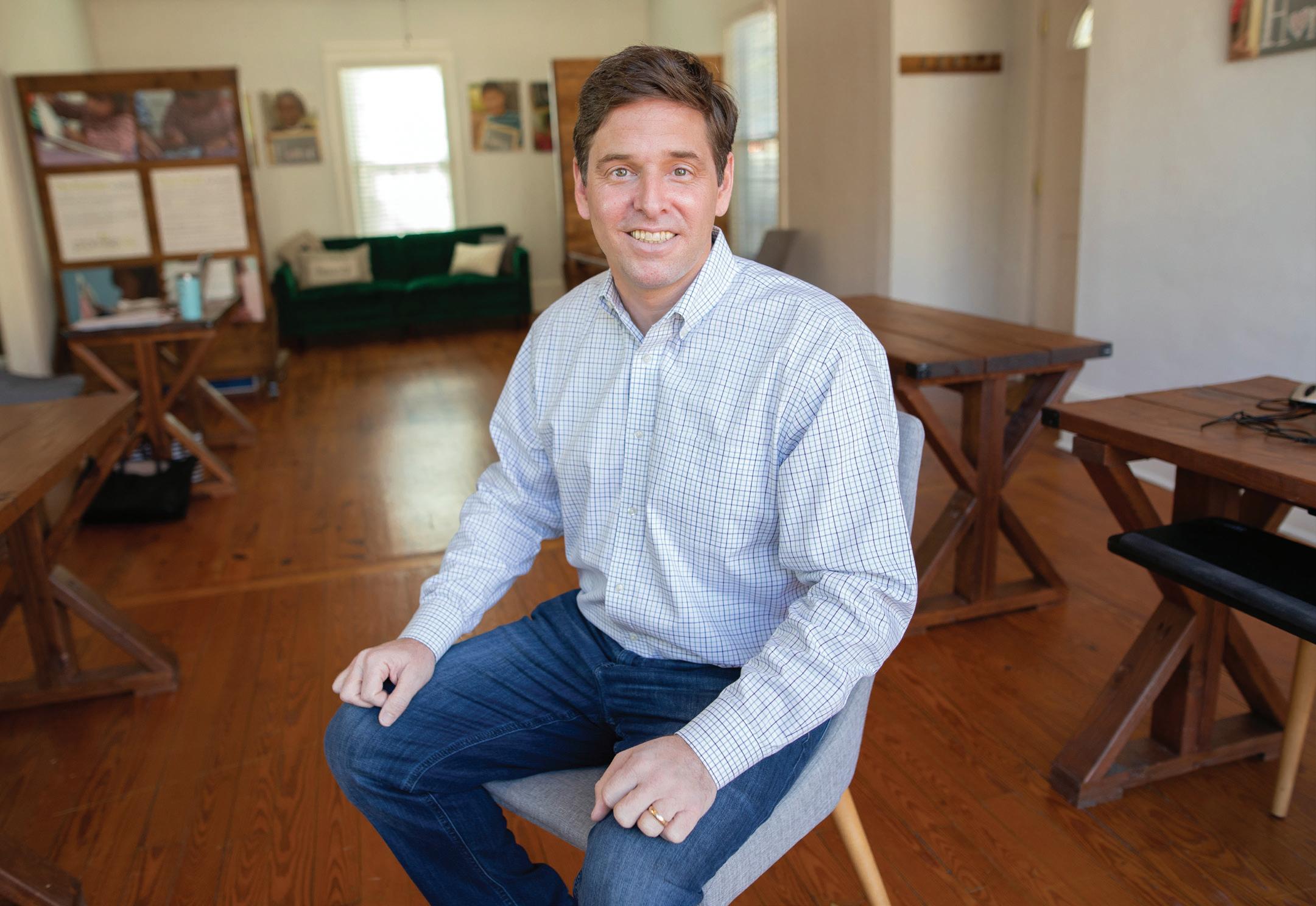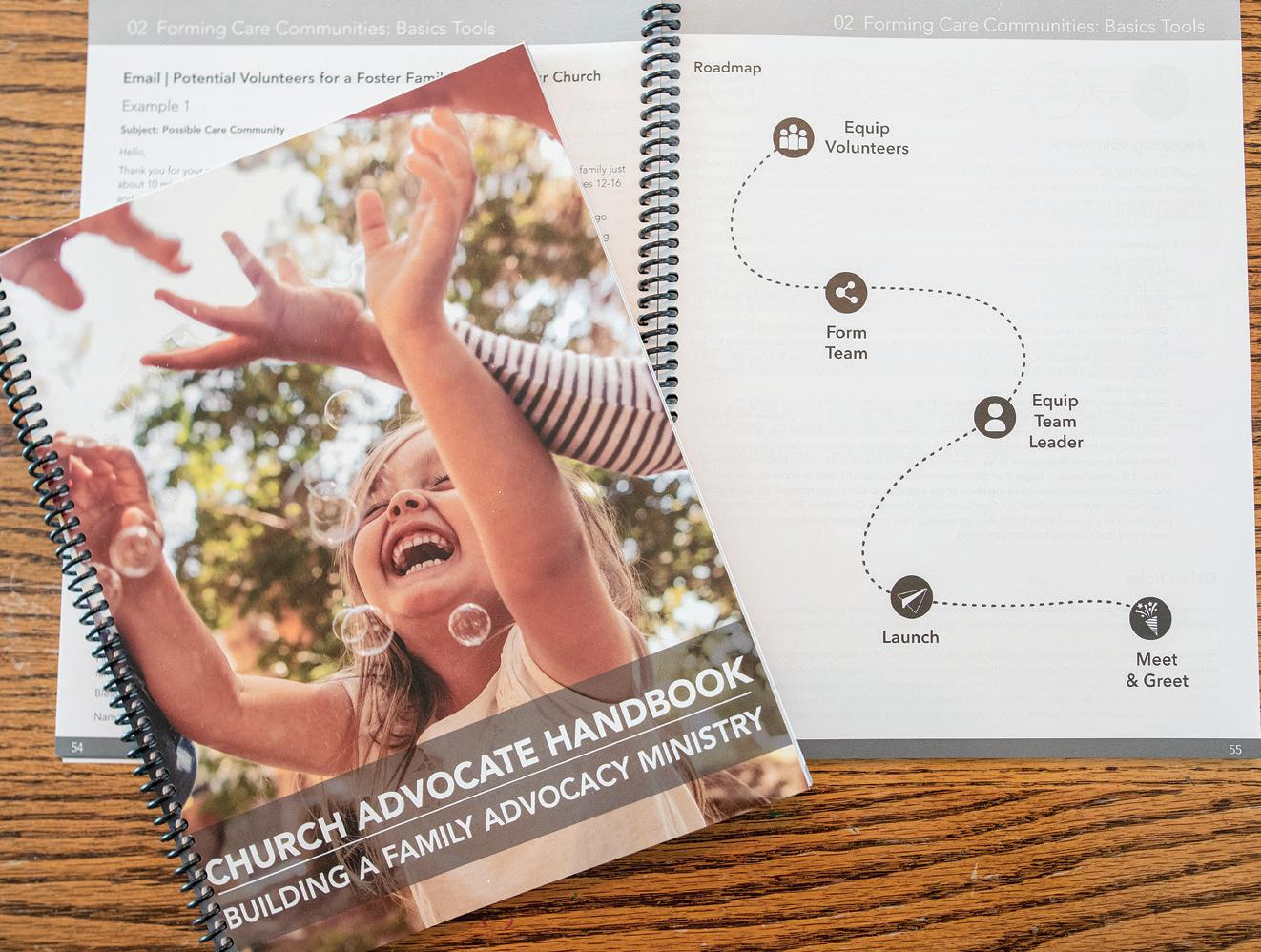
5 minute read
Local Non-Profit Makes Saving Children, Families Its Mission

Left, Andy Cook, president and CEO of Promise686
In the United States there are more than 400,000 children in foster care, according to a report from U.S. Department of Health and Human Services. The same agency reported that in 2019, parental rights were terminated 71,300 times in the U.S., effectively ensuring that they will not return home to their biological parents.
Story and photos by Isadora Pennington
Looking upstream, there are around 650,000 investigated and confirmed cases of abuse and neglect in the nation. Here in Georgia, there are approximately 12,000 children in foster care, according to the state Department of Family and Children’s Services (DFCS).
The national child advocacy organization, the Children’s Defense Fund, estimates that in the United States a child is removed from their home and enters foster care every two minutes.
To put it plainly, this is a big problem.
The child welfare system of the United States is under serious strain and organizations such as the DFCS are facing unprecedented challenges in helping children. Luckily, they aren’t doing it alone. Enter Promise686, a volunteer organization dedicated to providing pathways for churches to help children and families engaged in the child welfare system.
“To the degree that we can enter the story, and our work is to call churches to enter the story sooner, then their journey doesn’t start,” explained Andy Cook, president and CEO of Promise686. “The truth is that in spite of so many well-meaning and wonderful people trying to help in the child welfare system, the longer a child is in that system the worse their outcomes are.”
Cook found himself at the helm of this organization by way of his own personal journey of adoption. Cook and his wife Martha adopted two Ethiopian children in 2008. In the years since they added a third biological child and most recently adopted a set of five siblings from right here in Georgia. Today, Andy and Martha are parents to 10 children that range from age 8 to age 22.
At the time of their initial foray into adoption, Cook was working in administration and teaching at Wesleyan School in Peachtree Corners. He was on the cusp of a drastic career change and was preparing to take the LSAT before pursuing work as a lawyer.
“It was all driven out of a heart that wanted to see justice alive, specifically for kids,” said Cook. Eventually, after discussions with his wife, he realized that what he wanted to do was bigger than 40 hours a week: it was an integration of these values into his daily life.
Birth of a ministry
At the onset of this process and daunted by the logistical and financial implications of adoption,




the Cooks learned of and applied for an adoption fund organized by their church, Perimeter Church. Though they began the process with “$15 and a prayer,” by the time 13 months had passed the Cooks had managed to raise $40,000 with the help of the church, fundraisers and garage sales.
After their successful adoption in Ethiopia, the leaders of Perimeter Church approached Cook and asked if he would consider spearheading a ministry to help other prospective adoptive and foster parents in the community. That initial ministry is what would later grow to become Promise686.
“The simple objective for Promise686 is to plant ministries in local churches that will care for kids. That’s the idea,” said Cook. “If we can raise up leaders in churches who will become conduits to care for children in their community, that’s a win. We want to make the idea of a FAM — a Family Advocacy Ministry — an element of every church’s DNA.”
Citing a specific verse from The Bible, James 1:27, which states that pure religion is tied to caring for widows and orphans in their distress, Cook spoke of the unique connection between the church and children in the community. He has always been interested in the relationship of church and the government, noting that they are often at odds. One area where they can do great things, however, is in the service of children in need. In working with DFCS and case workers, Promise686 can identify and provide support to families and children in various stages of government intervention.
“There are really three strategic roles for this ministry. One is that we would prevent children from coming into foster care by serving their biological families really well. Two, we would intervene if and when children do come into care by raising up new foster families and wrapping around these families for the longevity of their placement. The third is to connect children and families for everyone. Prevent, intervene and connect.”
Above and beyond providing financial assistance, the Family Advocacy Ministries (FAMs) arranged by Promise686 are educated in methods to cultivate a community which provides new adoptive and foster families with support. That support can look like meal calendars, donations of furniture and clothing, coordination of transportation or babysitting. Sometimes these placements can come about in 24 hours or less, and in those cases a local mobilized community effort can make all the difference for these families.
“The church really is a conduit for the care of local children. If you saw it as a business model, our primary clients would be those churches because they have the infrastructure as institutions to do amazing work. They have a mobilized and ready group of people who have a scriptural backing for why they want to move in this,” explained Cook.
While Cook’s personal journey has been that of an adoptive parent, something which has greatly enriched his life, he also acknowledges that simply entering the welfare system can be devastating for children. That’s why one crucial element of Promise686’s work is to effectively interrupt the process before children are removed from their homes.
Myriad factors lead to neglect
One common misconception about children who enter the child welfare system which Cook hopes to dispel is that the majority of removals are due to abuse. In actuality, children exit their family homes due to neglect about 80% of the time.
Breaking that figure down even further, neglect can be pur-








